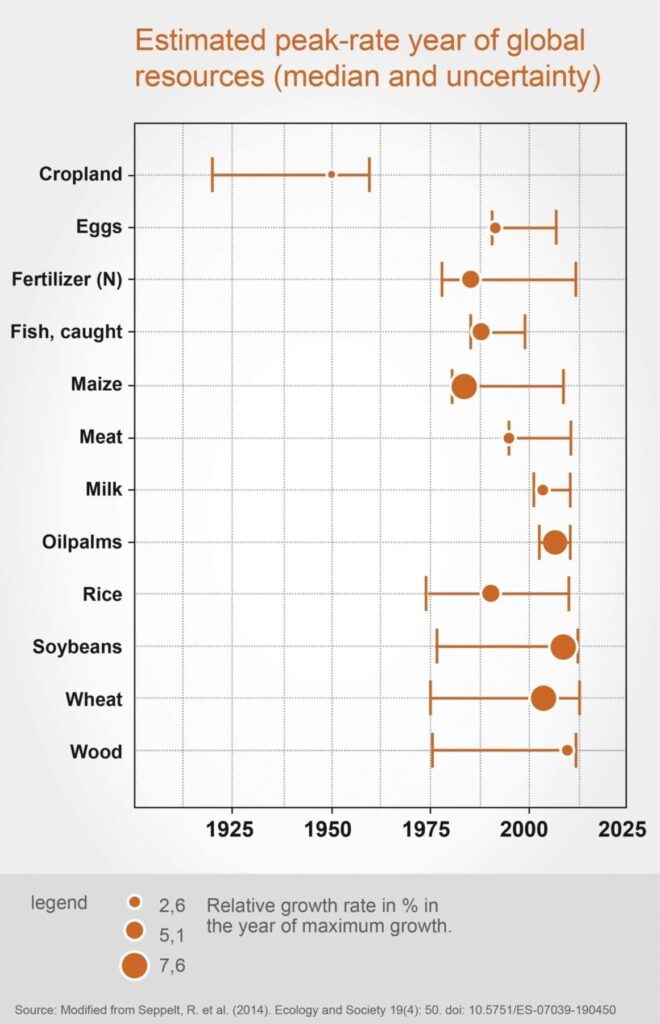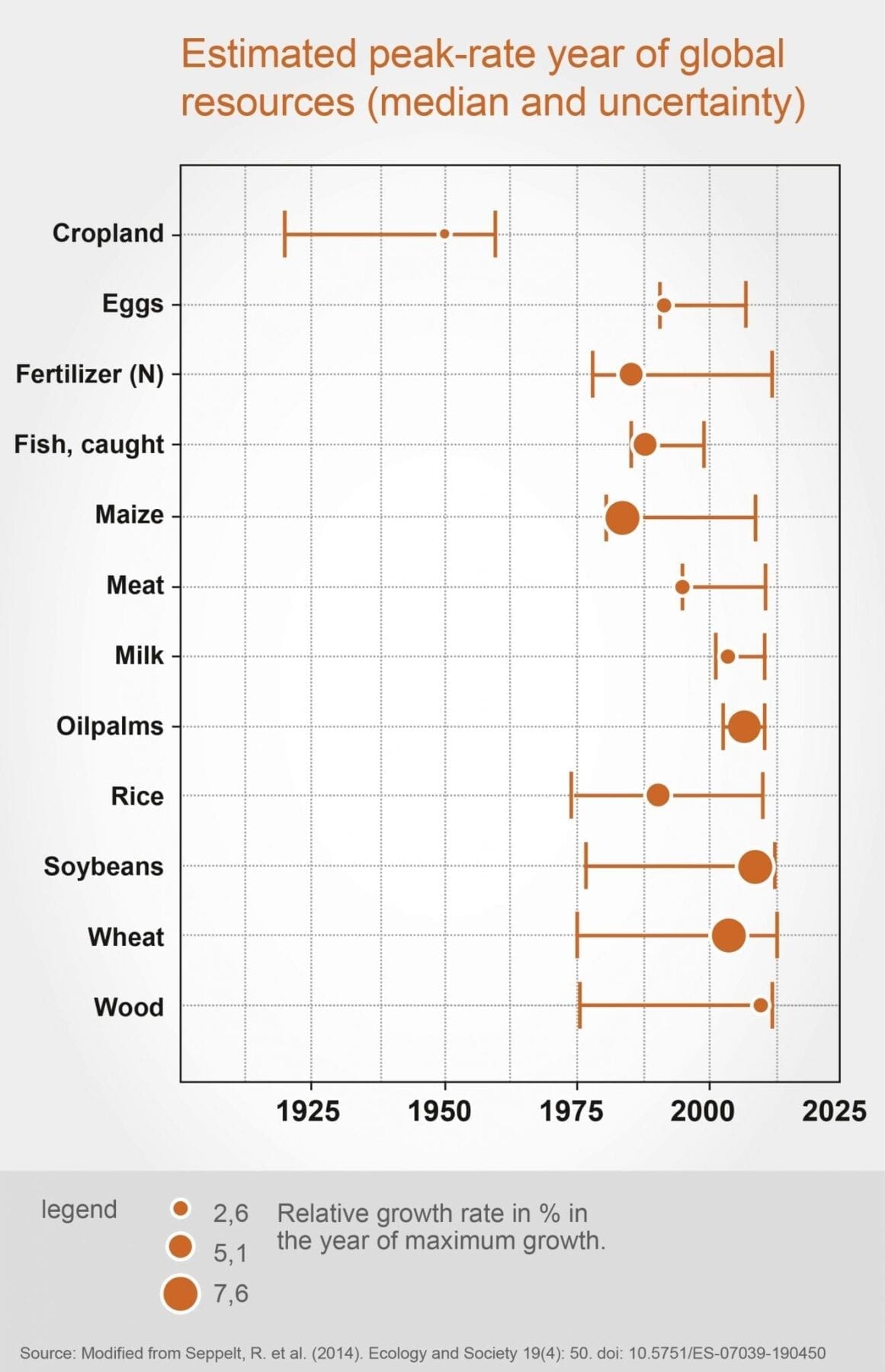
Humanity should use planetary resources with care
Can the world continue expanding its use of renewable resources at an increasing rate? Most likely not. Using a data set of over 25 resources researchers at the Helmholtz Centre for Environmental Research (UFZ), Yale University and Michigan State University demonstrate that several key resources have recently passed, at around the same time, their “peak-rate year” — the maximum increase year. A potential implication is that as substitution becomes arduous, global society’s expanding needs will be harder to fill. They explain this in an article published in the latest issue of the international journal Ecology and Society, and featured in the journal Nature’s Research Highlights this week.
Landscape ecologists Prof. Dr. Ralf Seppelt, Dr. Ameur M. Manceur and plant ecologist Dr. Stefan Klotz from the UFZ analysed the production and extraction rates of 27 global renewable and non-renewable resources together with economist Dr. Eli Fenichel from Yale University and sustainability scholar Dr. Jianguo Liu from Michigan State University. They examined 20 renewable resources, such as maize, rice, wheat or soya, which represent around 45% of the global calorie intake according to the Food and Agriculture Organisation of the United Nations (FAO of the UN), as well as animal products, such as fish, meat, milk and egg. For 18 of these renewable resources the annual growth rate (for example the increase in meat production or in fish catch) reached its peak — the peak-rate year — around 2006 a few years ago.
The term peak in the context of resource use is not new as it was popularized in the discussion about peak oil initiated in the mid-1970s. The peak oil analysis of the mid 1970s alleged that the crude oil extraction rate would significantly decline after a given year. Whether such a decline will happen and what would be the ultimate cause has been hotly debated among scientists. Though oil production has actually continued to expand, other resources have followed such a pattern. UFZ researchers used a dataset of more than 25 resources and made limited assumptions, relying on computer power to extract pattern from the database. “For many resources, but not oil, we indeed observed a peak pattern”, states Dr. Seppelt.
Surprisingly, they discovered not only that 20 resources had a peak-year but also that for 16 of the 20 resources with a peak-year, the peak-year lay between 1988 and 2008 — a very narrow range in the history of humanity! “The key commodities that a person needs for food and must harvest are limited”, summarizes Dr. Seppelt, Head of the Landscape Ecology Department at the UFZ. Renewable resources become scarcer. The authors were able to illustrate this using a various examples: The maximum global growth rate in crop yields for soya beans was in 2009, for milk it was 2004, for eggs it was 1993 and for the fish caught it was 1988. Data from other studies confirm these results. For example, the crop yield per area with maize, wheat, soya and rice on more than a quarter of the farming area around the world is stagnating or decreasing according to the US scientists.
Read more: Renewable resources reach their limits
The Latest on: Reneweable planetary resources
[google_news title=”” keyword=”Reneweable planetary resources” num_posts=”10″ blurb_length=”0″ show_thumb=”left”]
via Google News
The Latest on: Reneweable planetary resources
- Saving lives and truth: why protecting environmental journalists matters more than everon May 2, 2024 at 4:21 am
Ahead of World Press Freedom Day, experts are urging more protections for environmental journalists, 30 of whom were killed between 2009 and 2020.
- Healing the planet depends on all of uson April 26, 2024 at 2:00 am
The global summit on the planet’s health held in Kuala Lumpur in April 2024 developed the Kuala Lumpur Call to Action. Take the time to see what you can do for our beleaguered planet.
- Climate Policy Is Workingon April 24, 2024 at 7:50 am
KELLY SIMS GALLAGHER is Professor of Energy and Environmental Policy and Interim Dean of the Fletcher School at Tufts University. These young people despaired of attempts by their governments to ...
- Earth Day 2024 report card: Experts address America's climate change actionon April 22, 2024 at 3:19 am
"The global Earth observations community has characterized a triple planetary crisis of interconnecting ... "The problem, however, is the counterforces." The funding for renewable energy resources ...
- New scientific interventions are here to fight climate change. But they aren’t silver bulletson April 22, 2024 at 3:00 am
Giant sun shades, 40-foot-tall air filters, stratospheric sulfur injections: Here are some of the wild and wondrous ways we might save the planet.
- Pluto gained a ‘heart’ after colliding with a planetary bodyon April 19, 2024 at 11:25 am
After an analysis involving numerical simulations, the researchers concluded a planetary body about 435 miles in diameter, or roughly twice the size of Switzerland from east to west, likely ...
- Making waves for a blue economyon July 6, 2023 at 9:08 am
How can the blue economy help restore and protect this vital planetary resource? Ahead of the 2022 ... to emerging sectors such as ocean renewable energy and marine genetic biotechnology, a ...
- Dynamics of Planetary Systemson March 20, 2023 at 6:24 am
If you have assigned this textbook in your course, you may gain access to the instructor resources described on this page by clicking the link below. All requests for instructor access are verified by ...
- 5 reasons you should care about our oceanon June 21, 2022 at 5:24 pm
Heating, pollution, acidification, and oxygen loss pose serious threats to the health of the ocean and to all living beings who call this vast planetary resource their home. Why should you care?
- Principles of Planetary Climateon March 14, 2022 at 1:19 am
These online resources offer additional content for instructors and/or students that support enhanced teaching and learning outcomes and can be accessed online or downloaded for offline reading.
via Bing News











